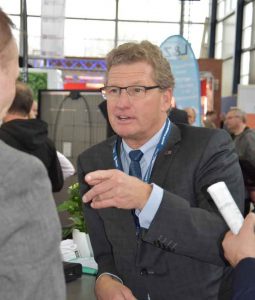It’s been a long time since things were moving forward at the pace they have been in recent months. And it has been just as long since the mood was that optimistic in the energy sector. Wherever you look, you feel as if a new chapter has begun. It certainly feels a lot different than past times of doom and gloom in the fuel cell and hydrogen industry.
Several developments have provided fresh impetus to the sector. Some who once seemed indifferent to the issues of today’s generation methods are suddenly debating how to make the energy system fit for the future, while the younger generation has taken an interest in climate and energy matters. And even politicians seem to have realized that business as usual is no longer a viable option but that they will have to explore, and possibly take, new avenues.
One event that recently generated headlines in several parts of the world and has proved the younger generation can be as interested in and committed to something as anyone else is Fridays for Future, a campaign where students leave the classroom each week to protest climate inaction. They, however, are not the only ones telling everyone what they think of today’s climate and energy policy. In the meantime, these peaceful protests have been joined by not only parents but also many scientists and high-ranking politicians (see p. 7).
Things are moving especially fast in the northern German states (see H2-international, January 2019). Just recently, Jan Philipp Albrecht, Schleswig-Holstein’s environment minister, said that “this is about nothing less than a transformation from the days of analog coal power production to a digital age in which energy is generated by renewables. Whether we produce it from wind or PV, we want to usher in this new era of smart grids by meeting all our energy needs from renewable sources.“
The economy minister in the state cabinet, Bernd Buchholz, added that “hydrogen is the key. We now need to take a big leap toward a hydrogen economy as fast as possible. We need to create production capacity large enough to reap economies of scale and take the lead in hydrogen technology. The living laboratories planned by the federal government could help meet that goal, although demonstration is more likely a thing of the past. We need to shift into high gear.” Hamburg even saw the founding of a northern German hydrogen business network (see p. 11). The city’s senator for the environment, Jens Kerstan, said at the launch meeting that “we could speed up the energy transformation by a lot if we used renewable electricity in the heat and transportation markets.“
Everyone, it seems, wants the same things right now. The German state of Brandenburg is joining the efforts, too, by organizing its first-ever hydrogen conference in Potsdam. Jörg Steinbach, its economy and energy minister, has shown a willingness to support hydrogen and power-to-gas projects, even if he still seems a bit hesitant. At the energy storage conference, he said he first intended to talk to the ministers in other German states before being the only one to submit a petition before the Bundesrat. In the first months of being minister, he has apparently not been told about the many projects that have been launched in northern Germany and in which Brandenburg could readily participate (see p. 12).
The changing mood at the state level, however, has not yet gotten through to the federal parties. H2-international’s first survey of the energy policy landscape shed little light on each party’s views. Yes, there are some that have shown support for the technology and come up with some intriguing ideas. However, it seems that most party platforms do not yet include thoroughly sustainable energy policy (see p. 42).
Still, after many unheeded calls, there is hope that the government could finally create the regulatory framework needed to implement the energy market transformation: At least, the Coal Commission is opening a path for putting in place concrete measures and laws to turn sustainable energy policy into a reality (see p. 44). And economy minister Peter Altmaier himself stated publicly that “this is where we need to make use of hydrogen.“ (see p. 10)
That’s all we needed to hear, isn’t it?


























0 Comments